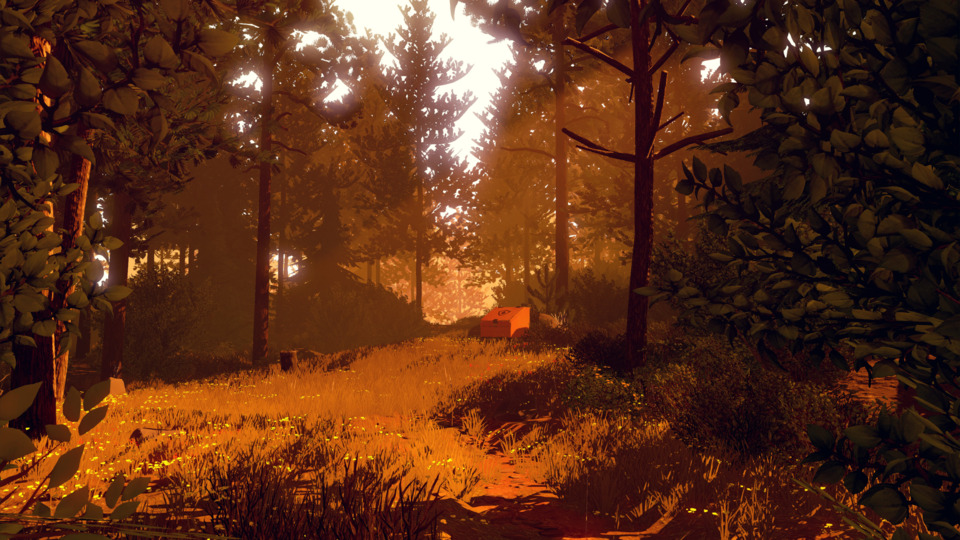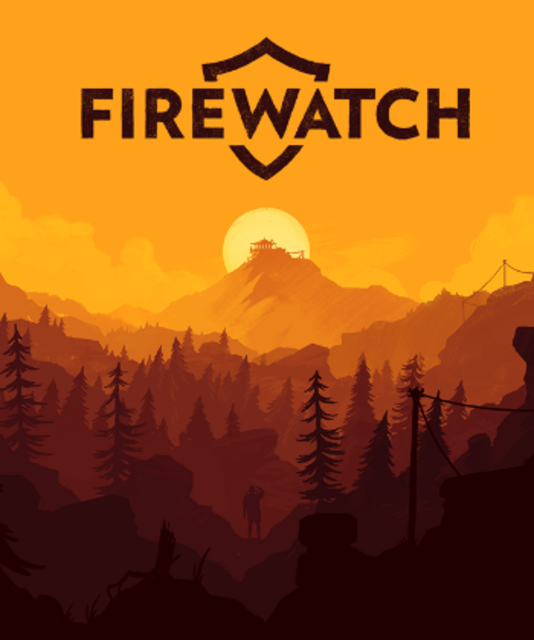A Compelling Narrative Not About Scaring You, But About Being Scared.
Firewatch is not a horror game. This is something I knew – or at least thought I knew – going in, and it’s something I can confirm coming out of it. However, I wouldn’t be surprised by anyone who were to see portions of it, or even someone who was halfway through it’s four to five hour narrative, reaching the conclusion that this was a game instead to scare or frighten. Instead, it’s a game more about being scared than it is scaring the player. This may seem like a flimsy distinction, but I think it’s an important separation to make.
The player character Henry, played by Rich Sommer in one of the games two standout – albeit only – performances, is afraid. It’s hard to talk about the story without getting into the particulars, but suffice to say that Henry has taken a new job in order to run away from his responsibilities and a bad situation that he couldn’t handle. The job in question is a lookout in a national park in Wyoming, far from his home in Colorado and secluded from the rest of world.
Once there, he begins a friendship/working relationship with his boss Delilah – played by Cissy Jones – whom he communicates with exclusively through radio, and it is here that the meat of the player agency takes place. Like other *sigh* … “walking simulators”, there is very little in terms of game play outside of the light puzzle solving and navigation of the world, with the critical exception, however, of conversing with Delilah.
The conversations between Henry and Delilah showcase Firewatch’s excellent writing and character development, as well as allow the player to create their own version of Henry to some limited extent. These exchanges can vary so much that they almost work against the game in a strange way, and I’ll touch on that later, but they are the reason one might want to play the game again, as there are no alternate solutions to the puzzles outside of the one true answer needed to progress.

The game effectively has no other characters besides these two, and by not seeing either (you can look down at Henry’s body, but never really see his face) the feeling of isolation sets in at an early point. Perhaps the most striking and effective quality of the game – even more so than the strong characterization – is that of the oppressively lonely and unsettling atmosphere. More than once there was a creeping sense of lurking dread as I made my way through the woods in twilight, the burnt orange sky staining everything with a surprisingly evil glow.
This becomes even more pronounced as the idea that Henry and Delilah are not alone in the park sets in, and soon enough every corner had the potential for a surprise scare or startling set piece. This persists throughout the game leading up to its conclusion, and it’s here that mileage may differ significantly from person to person. With little else in terms of mechanics, the story is ultimately what Firewatch lives or dies on, and I personally found the conclusion to be slightly disappointing, but only because the build-up was so engrossing that the real thing could never live up to the expectations I had formed. While, it wouldn’t be a stretch to expect the ending to be more spectacular, Firewatch puts such emphasis on the mundane things that can please or bother us as human beings, that a spectacular ending would have felt more incongruous than it would satisfying.
Another way that game can be a victim of its own success is in the branching dialogue. In a way, this works to make each experience it’s own special thing, but the way that you answer questions can effect what topics do or do not get brought up in conversation later in the game to the point of being dropped completely. I was avoiding talking about Henry’s past as I personally found those options fit best with my understanding of the character, or at least the character I was playing. However, this caused the subject to be dropped in such a way that I never really got any sense of closure on it. Again, this may even be a point in favor of the game, as the “real life” discussions that are executed upon so well often don’t actually have any closure in them, but I did feel like there was room for a little more to be said. This is a an issue many – maybe even most – players will not face or have an issue with at all, but I would have been more careful with my choices if I’d known I wasn’t going to have an opportunity to expand on some of them later.

The last issue worth mentioning was an uneven frame rate that was mostly forgivable, but once or twice became so noticeable as to take away from the experience for a brief moment. Having only played the console version, I cannot speak to the PC, but on the PlayStation 4 there were multiple times were it hitched for half a second before mostly recovering. Nothing was a deal-breaker, but it was obvious enough that it couldn't go unsaid.
Ultimately, these small grievances could be over-looked – or were subjective enough that others wouldn’t notice – so it’s easy to recommend this game for being unlike almost everything else. There are many games that try to scare the player, but few are as concerned with scaring the actual characters. Whether it’s Henry’s own fear of what remains back home, Delilah’s fear of losing her job as troubles mount, or their shared fear that something’s not right in the park, Campo Santo have created a portrait of scared, maybe even cowardly people dealing with the challenges in their lives that few other games ever paint, and does it with such tact and refinement that it must be applauded for it.
